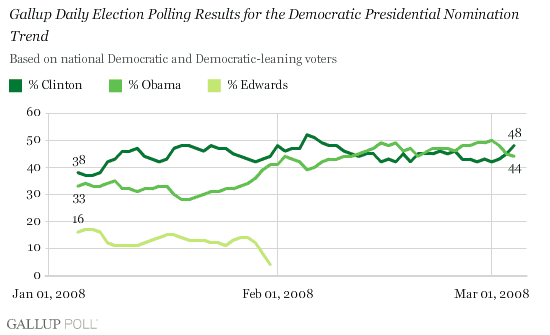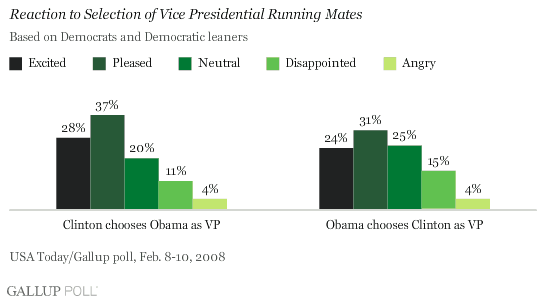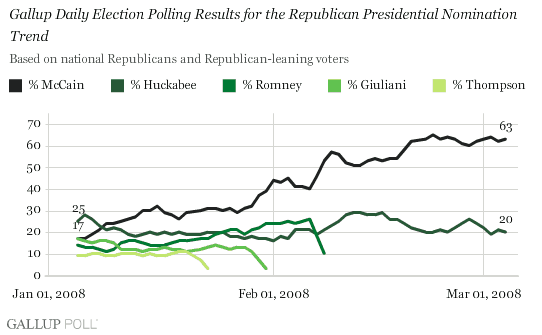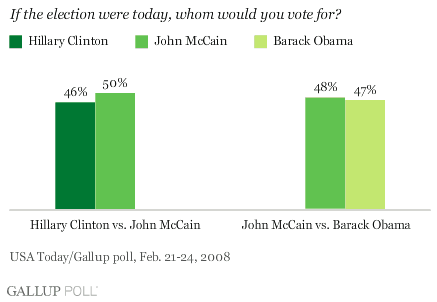PRINCETON, NJ -- After Hillary Clinton's Tuesday victories, the outcome of the race for the Democratic presidential nomination will depend on the votes of the shrinking number of Democrats who have yet to cast a ballot in their states' primaries and caucuses, and on the votes of party superdelegates at the Democratic National Convention this summer.
The sentiments of rank-and-file Democrats across the country provide a useful and important indicator of which of the two candidates would be most satisfying to those who will be expected to support him or her in the November election.
Those sentiments have shown a great deal of change this year. Frequently, the race has been very close. But at one point in January, Clinton led Barack Obama by 20 points among Democratic voters. Recently, Obama had pulled ahead by 8 points. At the moment, Clinton has a slight 4-point edge over Obama in terms of national Democratic support, 48% to 44%. This is based on data collected largely before the results of Tuesday's voting became known.

Meanwhile, although the assumption is that Clinton and Obama will continue to campaign, discussion will continue on the possibility that one of the candidates could take some other action -- including a decision to announce a joint ticket.
The polling information available at this point suggests that Democrats broadly support Clinton continuing her candidacy. An ABC News/Washington Post poll conducted before Tuesday's voting found that 67% of Democrats favored Clinton staying in the race if she won in either Texas or Ohio. Given that she won both primaries, the former by 3 points and the latter by 10 points, it seems safe to assume that rank-and-file Democrats want the race to continue.
What about the possibility of a joint ticket? Clinton, when asked on an early morning talk show Wednesday about the possibility of sharing a ticket with Obama, said: "Well, that may, you know, be where this is headed. But of course, we have to decide who's on the top of the ticket."
The limited data Gallup has on the possibility of a shared ticket between Clinton and Obama come from a Feb. 8-10 poll. Most Democrats and Democratic-leaning independents say they would welcome the pair on their 2008 ticket, with slightly more (at the time of the poll) saying they would be "excited" or "pleased" with a Clinton-Obama ticket (65%) than with an Obama-Clinton ticket (55%). The aforementioned ABC News/Washington Post poll also found that if Obama were to win the nomination, Democrats are much more likely to mention Clinton as their preferred vice presidential nominee than any other individual.

Meanwhile, exit-poll data from Tuesday's voting confirms that the patterns of voter support for Clinton and Obama are clearly drawn at this point. Obama's strength is a coalition based primarily on support from the significant majority of black Democratic voters, coupled with the support of young voters and voters who are upscale educationally. Clinton's strength comes from Democrats who have less education, those who are older, Hispanic Democrats, and, more generally, white Democrats. She also continues to do better among women than among men.
On the Republican side, the final Gallup tracking poll of Republicans shows that former Arkansas Gov. Mike Huckabee bowed out of the race for his party's nomination with 20% of the GOP vote. His voter base until the end was skewed toward conservatives and those who attend church frequently, as well as those who are younger.
Huckabee led the GOP field briefly after his win in Iowa, but McCain moved ahead in Gallup Poll Daily tracking after he won the New Hampshire primary. McCain never relinquished that lead, and it continued to grow as Fred Thompson, Rudy Giuliani, and Mitt Romney dropped out.

Gallup's latest measures of Americans' preferences between McCain and the two possible Democratic candidates in hypothetical general-election trial heats were obtained in late February and showed close contests between McCain and either Obama or Clinton. Once the Democratic nominee is known, the major focus will be on changes in support for the two parties' nominees as the campaign moves through the predictable phases of vice-presidential announcements, the party conventions, and the intense campaigning that will take place in September and October.

